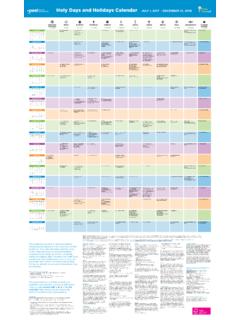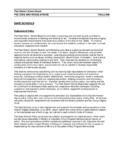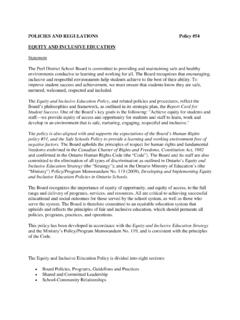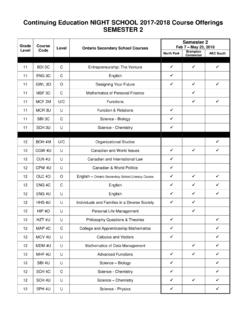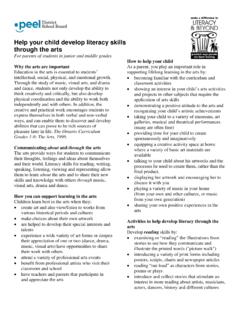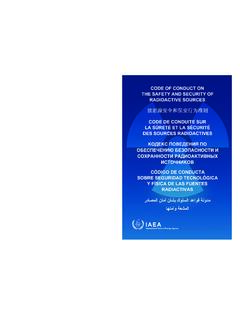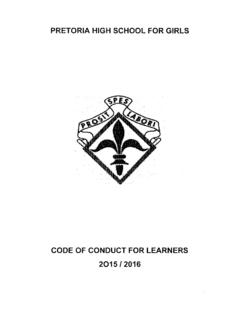Transcription of POLICIES AND REGULATIONS Policy #78 DIGITAL …
1 Peel District School Board POLICIES AND REGULATIONS Policy #78. DIGITAL CITIZENSHIP. DIGITAL Citizenship DIGITAL citizenship is defined as the norms of responsible behaviour related to the appropriate use of technology. These norms and responsibilities are an expectation in all Peel District School Board locations and are clearly outlined in each school's Code of Conduct. As individuals, we live and work in a world where people are connected to their devices at all times so we need to use technology effectively and respectfully. DIGITAL citizenship is an important part of what the Board helps students learn in school. Students will see teachers incorporate DIGITAL resources into their lessons. Educational online resources will be able to be accessed wirelessly through the Board's networks. As such, students will be encouraged to BYOD Bring Your Own Device. When relevant to curriculum and instruction, teachers will permit the use of any personal electronic device as a classroom learning device.
2 Students will also be able to access educational resources using their personal devices outside the classroom, in libraries, cafeterias and other common areas. By accessing the Internet while on Peel board property or by logging in with a board login, students accept all terms and conditions of the Peel board network and Internet use, as well as the terms outlined in this Policy . Statement of Policy The Peel District School Board is committed to providing and maintaining safe and appropriate environments conducive to learning and working for all. To improve student success and achievement, we must ensure that students feel safe, welcomed, respected and included. We want our students to be well-prepared to be successful in an evolving society. Fundamental to such success is the ability to use technology responsibly to gather, evaluate, construct and share knowledge in a 21st Century world. It is imperative that we support our students as 21st Century learners.
3 The Board provides users with access to technology to support teaching and learning, and to enable efficient Board administration and communication. Technology, including personally owned devices, must be used appropriately for these intended purposes. The DIGITAL Citizenship Policy supports the principles and expectations of the Board's Safe Schools Policy ( Policy #48) and the Board's character attributes caring, respect, cooperation, honesty, responsibility, inclusion to create positive climates for learning and working, and school Codes of Conduct. The Policy is aligned with and supports the principles and expectations of the Board's Human Rights Policy ( Policy #51) and the Equity and Inclusive Education Policy ( Policy #54). At all times, this Policy should be interpreted to be consistent with the Board's POLICIES and the Human Rights Code. Peel District School Board Policy 78. pg. 2. Definitions Technology Technology resources include, but are not limited to, computers, phones, cellular/mobile technology, servers, networks, Internet services, computer applications, data, email and collaboration tools, as well as third-party Internet services provided to the Board.
4 Examples of third-party web services include E-Learning Ontario and online textbook providers. User A user is any individual granted authorization to access technology, as defined above. Users may include students, parents, staff, volunteers, visitors, contractors, or individuals employed by service providers. A. Responsibilities a) All users are responsible for: ensuring that technology is used in accordance with Board POLICIES and procedures complying with the school's Code of Conduct ensuring that technology is used to support teaching and learning in accordance with Peel's teaching and learning expectations using technology in a lawful, responsible and ethical manner consistent with the purposes for which it is provided their personal network login and password it should not be shared with anyone other than a parent/guardian (students). ensuring that photos, videos or images of an individual/group are not posted online/shared digitally unless consent from the individual(s) over the age of 18 or parental consent (for those under the age of 18) has been obtained.
5 Photos, videos or images cannot be taken using any device unless authorized. technology is not used for political or union business unless approved by the board b) Superintendents, principals and managers/supervisors are responsible for: ensuring that staff are aware of the Board Policy establishing and monitoring DIGITAL citizenship and responsibility through the school's Code of Conduct instructing and modeling, for staff and students, DIGITAL citizenship and responsibility c) Teachers are responsible for: the supervision of student use of technology within the teacher's assigned teaching area instructing and modeling, for students, DIGITAL citizenship and responsibility determining when students are able to access Board technology or their personally owned devices, for educational purposes only d) Students are responsible for: using Board technology for curriculum-related/educational purposes only using personally owned technology for curriculum-related/educational purposes only while on Board property Peel District School Board Policy 78.
6 Pg. 3. demonstrating DIGITAL citizenship through the appropriate use of technology, as outlined in schools' codes of conduct reporting any inappropriate use of email, data or unauthorized technology to a teacher or administrator immediately the care, maintenance and security of their personal devices the Board is not responsible for the replacement of lost, stolen or damaged items B. Scope This Policy applies to all Board technology and to all personally owned technology, as defined above. The application of this Policy includes: the use of all Board-owned technology, such as computers, phones and mobile devices, networks, applications, and websites regardless of where they are used. This includes the use of Board-owned technology when used off Board property. the use of personally owned technology, including personally owned computers and mobile devices, when used on Board property or when used to access Board resources.
7 The Policy also applies to use of personally owned technology when off board property. Inappropriate use of personally owned technology, while on or off school property, that has a negative impact on school climate will result in a full investigation and necessary action will be taken, where appropriate. Consequences for inappropriate use are outlined both in the Code of Conduct as well in the Board's Safe Schools Policy ( Policy #48). any access to Board technology resources regardless of the location and ownership of the device used to access Board resources. Specifically, the Policy applies to home, remote, or wireless access to the Board network, websites and applications. the use of third-party information technology services provided to the Board. This includes Internet services provided by the Ministry of Education. C. Guiding Principles There are five guiding principles for DIGITAL citizenship and responsibility: 1.
8 Intended use: Board technology is provided for educational and administrative purposes. Technology should be used for these intended purposes only. 2. Security and safety of Board data: Users should take reasonable precautions to ensure that the data that they use is secure and safe. Data should be used for the intended purposes only. 3. Responsible resource usage: The Board's technology resources are shared and limited. Users should use technology resources responsibly and should not waste resources. Personal materials should not be stored on Board property. 4. Legal compliance and adherence to Board POLICIES : Users are expected to comply with federal and provincial legislation, as well as Board POLICIES and corresponding Operating Procedures. Peel District School Board Policy 78. pg. 4. 5. Ownership of data: Board technology and all data stored on Board technology are owned and may be accessed by the Board.
9 Users should have no expectation of privacy in anything they create, store, send or receive using Board technology. Intended Use Technology is provided for educational and administrative purposes and should be used for these intended purposes only. Prohibited uses of technology include, but are not limited to: personal use that is not limited and/or occasional use that violates federal or provincial laws use of Board technology for commercial or political party purposes use that contravenes Board POLICIES and/or Operating Procedures theft of resources, including electronic data theft unauthorized access, alteration, destruction, removal and/or disclosure of data. This includes the unauthorized disclosure of Board email addresses, distribution lists, and user account information. unauthorized access or disclosure of confidential information creating, displaying, storing or sending fraudulent, harassing, sexually explicit, profane, obscene, intimidating, defamatory or otherwise inappropriate or unlawful materials cyberbullying copying, downloading, transferring, renaming, adding or deleting information protected under copyright law use that could reasonably be expected to impair the Board's computing facilities or interfere with others' use of Board technology ( viruses, spam) including the sending of electronic chain mail agreeing to license or download material for which a fee is charged to the Board without obtaining express written permission from the Board's Learning Technology Support Services staff.
10 Purchasing of materials and services must comply with all procurement POLICIES and procedures. Security and Safety of Board Data Users should take reasonable precautions to ensure that data that they use is secure and safe. Staff are given access to data in order to perform their job functions. Data should be used for the purposes intended. Other uses of data are strictly prohibited. Data may include but is not limited to student records, employee records, confidential assessments, and other personal information. Data may be held in more than one format such as an electronic document ( Word Document) or in a system such as email or the Student Information System. All Board data is included in this Policy . Peel District School Board Policy 78. pg. 5. Users are responsible for managing the accounts and passwords that provide access to data. Users are responsible for applying passwords to any personal device that accesses or holds Board data.
